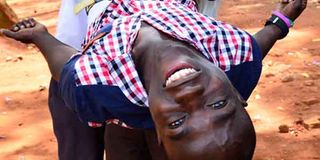50% qualify to join university

Students of Kakungulu Memorial School carry their best student, Jingo Ramanthan who scored 19 points in History, Economics, Geography and Sub Math. PHOTO BY Dominic Bukenya
What you need to know:
Mr Mathew Bukenya, the Uneb executive secretary, explained that out of the 114, 380 candidates who sat for the Uganda Advanced Certificate of Education (UACE), 53.8 per cent garnered at least two principal passes (2Ps), making them eligible to join institutions of higher learning
Kampala.
The Uganda National Examinations Board (Uneb) has reported that slightly more than half of last year’s Senior Six candidates qualify to join university this academic year.
Mr Mathew Bukenya, the Uneb executive secretary, explained that out of the 114, 380 candidates who sat for the Uganda Advanced Certificate of Education (UACE), 53.8 per cent garnered at least two principal passes (2Ps), making them eligible to join institutions of higher learning.
This is an equivalent of 61,479 students who qualify for admission to the 35 universities across the country.
However, he added that the number will increase to 88,975 (77.8 per cent) if other tertiary institutions which consider one principal pass and two subsidiary passes are considered for admission as opposed to 64,417 (64 per cent) who joined in 2012 at the same grading.
“The overall performance of candidates in 2013 shows that a very high percentage of candidates (97.3 per cent) qualified for the award of the UACE, about the same percentage as in 2012. At least 53.8 per cent of the candidates passed at the 2P level, the minimum pass level considered for admission to university,” Mr Bukenya said at the release in Kampala yesterday.
However, he said that it wasn’t possible for the board to compare current performance to the previous following a new policy guideline for students to register for not more than three subjects at the same time.
The policy further required students offering science combinations or economics but without Mathematics at the principal level to offer subsidiary mathematics.
While Mr Bukenya appreciated performance in traditional government-aided and well-established schools, he equated the quality of work from other centres to that of S4 students. Communication continues to be a challenge to most candidates failing to explain concepts as demanded in the questions.
“Good quality work was seen from many centres, especially the traditional government-aided schools and well-established private schools. At other centres, evidence of poor preparation was all too evident,” he said.
In terms of percentages, female students performed better than their male counterparts at the A-E level in History, Economics, Islam Religious education, Christian Religious education, Geography, Literature in English and Mathematics.
However, the male candidates performed better in sciences. There was a drop in performance in History, Entrepreneurship skills, Literature in English and Biology.
Mr Bukenya noted that although the core sciences and mathematics are compulsory at Senior Four, the transition to A-level in the same subjects has remained low.
For instance, he said that 24.8 per cent of the candidates offered Mathematics, 17.4 per cent did Physics while Chemistry and Biology were at 8.2 per cent and 8 per cent respectively.
Entries in Chemistry dropped from 10.5per cent in 2012 while that in Biology also declined to 10 per cent. Despite registering fewer science candidates, the board also reported that nearly 50 per cent of the candidates were unable to obtain a principal level pass.
“The level of performance, coupled with low entries for the subjects will have negative impact on the country’s manpower needs in science, technology and skilling Uganda,” Mr Bukenya said.
At least 594 students will wait a little longer after their results were not released. Of these, 34 had theirs withheld compared to last year’s 404 following allegations of collusion, smuggling of unauthorised materials in the examination room and some gaining access to confidential instructions sent to schools.
The other 560 students were from 12 schools whose centres didn’t comply with Uneb registration regulations which require candidates to either register for subsidiary mathematics or ICT.
The minister of Education, Ms Jessica Alupo, appealed to school heads to move away from drilling students through tests to teaching to help them understand concepts which will enable them acquire skills relevant to the world of work.
Two districts, Nakapiripit and Buvuma, had no candidates registered for UACE. Mr Daniel Odong, Uneb deputy executive secretary in charge of secondary attributed this to lack of an A-Level school in the areas.




